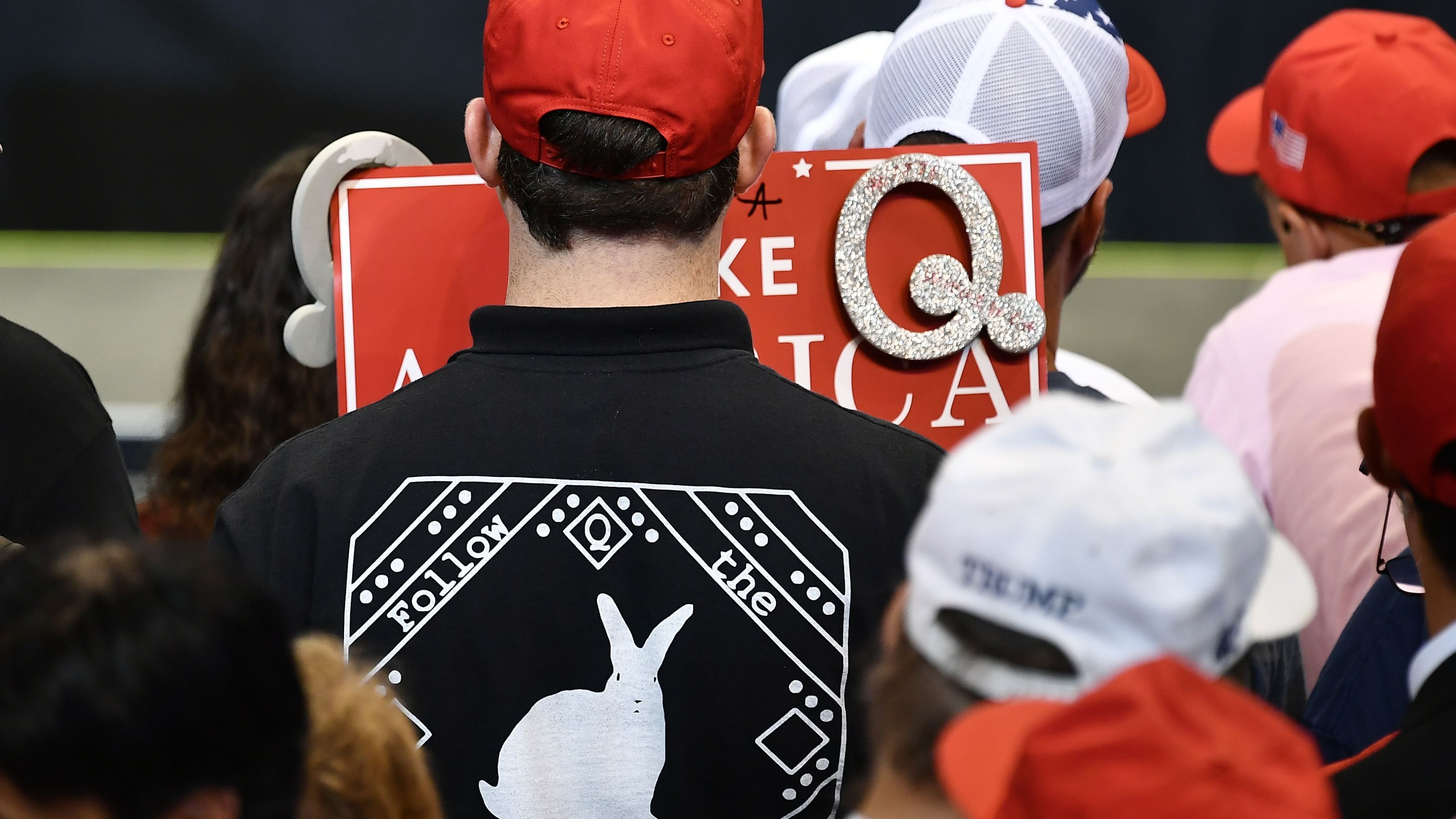One in four Britons believe in QAnon-linked conspiracy theories, study finds
Influence of the far-fetched theory has spread alongside the coronavirus pandemic

A free daily email with the biggest news stories of the day – and the best features from TheWeek.com
You are now subscribed
Your newsletter sign-up was successful
A movement that has been identified as a terror threat by the FBI after beginning life among Donald Trump’s most unhinged supporters is finding fresh support in the UK, according to new research.
The QAnon conspiracy theory emerged from “a supposed intelligence agent” known as Q, who “maintains that Donald Trump is actually a white knight waging a secret war against a powerful cabal of elite Satanist paedophiles using a secret language involving pizzas and harvesting children’s blood to create an immortality elixir”, says Wired.
Now, belief in those claims appears to be spreading. Of 2,000 people quizzed in a survey commissioned by the charity Hope Not Hate, 5.7% described themselves as supporters of QAnon.
The Week
Escape your echo chamber. Get the facts behind the news, plus analysis from multiple perspectives.

Sign up for The Week's Free Newsletters
From our morning news briefing to a weekly Good News Newsletter, get the best of The Week delivered directly to your inbox.
From our morning news briefing to a weekly Good News Newsletter, get the best of The Week delivered directly to your inbox.
And “larger percentages supported broader, linked conspiracies”, The Guardian reports. One in four (25%) of the survey respondents said they believed that “secret satanic cults exist and include influential elites”, and 29% endorsed the idea that “a single group of people who secretly control events and rule the world together”.
QAnon’s “language and ideas” appear to have spread hand-in-hand with Covid-19, “making their way into existing online communities and protest movements” across Europe, says Politico.
“If you feel like you’re losing control of your life, you’re more likely to believe in these conspiracy theories,” Jonathan Bright, a senior researcher at the Oxford Internet Institute, told the news site. “The coronavirus supercharged things.”
Sometimes the link is more direct. “In Britain, QAnon’s messages and memes have increasingly popped up in social media communities and at street demonstrations against lockdowns, mandatory face coverings and vaccination plans,” The Guardian reports.
A free daily email with the biggest news stories of the day – and the best features from TheWeek.com
Since the conspiracy encourages a mistrust of other sources of information, its supporters often resist attempts to debunk even the most extreme ideas.
“Unfortunately, I know first-hand that almost anything you say to them will be dismissed, ignored or rationalised away,” one former adherent told the New Statesman.
Holden Frith is The Week’s digital director. He also makes regular appearances on “The Week Unwrapped”, speaking about subjects as diverse as vaccine development and bionic bomb-sniffing locusts. He joined The Week in 2013, spending five years editing the magazine’s website. Before that, he was deputy digital editor at The Sunday Times. He has also been TheTimes.co.uk’s technology editor and the launch editor of Wired magazine’s UK website. Holden has worked in journalism for nearly two decades, having started his professional career while completing an English literature degree at Cambridge University. He followed that with a master’s degree in journalism from Northwestern University in Chicago. A keen photographer, he also writes travel features whenever he gets the chance.
-
 How the FCC’s ‘equal time’ rule works
How the FCC’s ‘equal time’ rule worksIn the Spotlight The law is at the heart of the Colbert-CBS conflict
-
 What is the endgame in the DHS shutdown?
What is the endgame in the DHS shutdown?Today’s Big Question Democrats want to rein in ICE’s immigration crackdown
-
 ‘Poor time management isn’t just an inconvenience’
‘Poor time management isn’t just an inconvenience’Instant Opinion Opinion, comment and editorials of the day
-
 How corrupt is the UK?
How corrupt is the UK?The Explainer Decline in standards ‘risks becoming a defining feature of our political culture’ as Britain falls to lowest ever score on global index
-
 The high street: Britain’s next political battleground?
The high street: Britain’s next political battleground?In the Spotlight Mass closure of shops and influx of organised crime are fuelling voter anger, and offer an opening for Reform UK
-
 Is a Reform-Tory pact becoming more likely?
Is a Reform-Tory pact becoming more likely?Today’s Big Question Nigel Farage’s party is ahead in the polls but still falls well short of a Commons majority, while Conservatives are still losing MPs to Reform
-
 Taking the low road: why the SNP is still standing strong
Taking the low road: why the SNP is still standing strongTalking Point Party is on track for a fifth consecutive victory in May’s Holyrood election, despite controversies and plummeting support
-
 What difference will the 'historic' UK-Germany treaty make?
What difference will the 'historic' UK-Germany treaty make?Today's Big Question Europe's two biggest economies sign first treaty since WWII, underscoring 'triangle alliance' with France amid growing Russian threat and US distance
-
 Is the G7 still relevant?
Is the G7 still relevant?Talking Point Donald Trump's early departure cast a shadow over this week's meeting of the world's major democracies
-
 Angela Rayner: Labour's next leader?
Angela Rayner: Labour's next leader?Today's Big Question A leaked memo has sparked speculation that the deputy PM is positioning herself as the left-of-centre alternative to Keir Starmer
-
 Is Starmer's plan to send migrants overseas Rwanda 2.0?
Is Starmer's plan to send migrants overseas Rwanda 2.0?Today's Big Question Failed asylum seekers could be removed to Balkan nations under new government plans